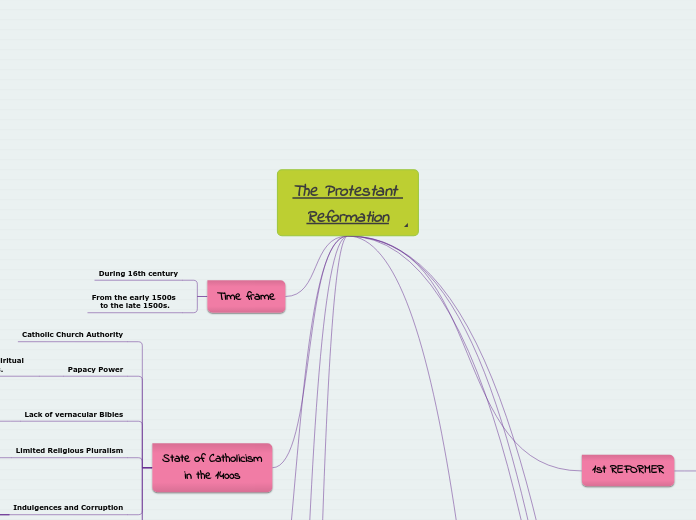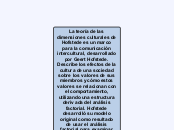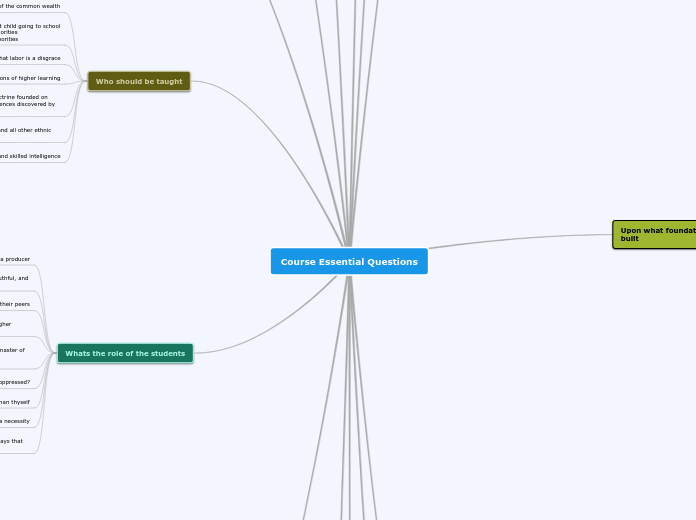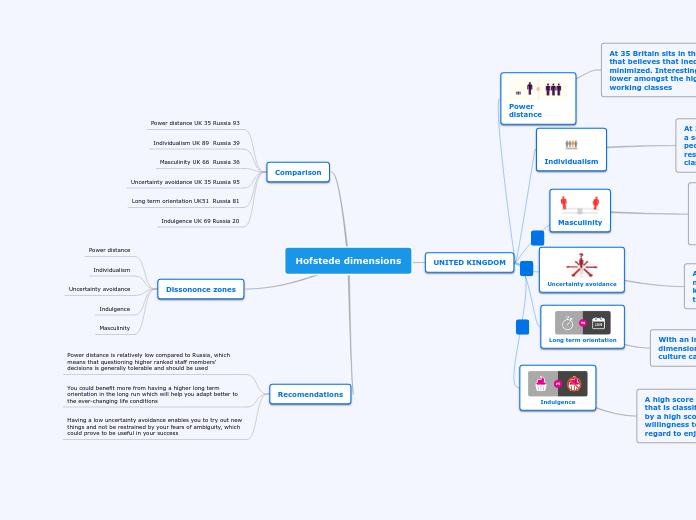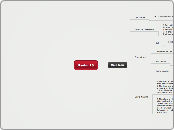The Protestant Reformation
CONSEQUENCES
Redistribution of power between monarchs, nobility and religious institutions.
Shift in Political Power
The growth of science, philosophy, and literature.
Religious diversity leading to new Protestant denominations.
Rise of individualism, critical thinking and religious tolerance.
Impact on Education and Science
Economic impact of conflicts and political changes.
Redistribution of wealth due to changes in religious and economic systems.
Development of the idea of religious freedom
A period of intense theological debates and conlficts.
The creation of various Protestant denominations, each one with its own interpretation of Christian doctrine.
Causes
POLITICAL
Desire of rules to weaken the Church's influence and consolidate power
Power struggles between monarchs and the Catholic Church over authority.
SOCIAL
Access to the printing press
to spread ideas and to challege established norm
The rise of merchants and urban professionals challenged traditional hierarchies.
Growth of crticial thinking through humanism.
Humanism:
Focus on individualism and secular learning prompted critical examination of religious practices
ECONOMIC
Concerns over financial corruption, indulgences.
The outflow of local resources
Demand of social justice
Economics disparities .
Europeans princes and kings were jealous of the Church's wealth
Feudalism System's Impact
The rise of a middle class disrupted feudal norms, creating an environment where new ideas and criticisms could gain traction.
Peasants disagree on economic challenges and oppresive feudal obligations
Characterized by hierarchical relationships and land ownership, contributed to social inequality, prompting discontent and desire for change.
RELIGIOUS
Some Church leaders were wordly and corrupt.
No religious freedom
Religious dissents were persecuted and confined to have diverse beliefs and thoughts,.
Desire for espiritual Authority
People looked for a more direct connection to God and more personal religious experience.
Criticism of Church Practices
To the lack of reform.
For the sale of indulgences (essentially, paying for forgiveness of sins) and simony (buying and selling of religious positions) prevalent.
Indulgences were payments made to the Church in exchange for the forgiveness of sins or reduced time in purgatory. This practice was criticized by reformers like Martin Luther, who believed that salvation could not be bought and that it was a gift from God
For growing dissatisfaction with the extravagant lifestyles of clergy.
Main idea
Humanism: Focus on individualism and secular learning prompted critical examination of religious practices.
Print Revolution: The printing press allowed for the widespread distribution of ideas, challenging established norms.
Emergence of the Middle Class: The rise of merchants and urban professionals challenged traditional hierarchies.
Internal Renewal od the Church
To return to what reformers believes were the true teachings of Christianity
To cleanse corruption
To reform the Catholic Church's practices
State of Catholicism
in the 1400s
People's respect for priest,monks, popes.
Goverment separated from the Church
Indulgences and Corruption
Heavy taxations
Inmorality
Abuse of power
The sale of indulgences by Church's officials
Needed money for St. Peter's Basilica
Financial corruption
Limited Religious Pluralism
Religious diversity and opposing views were often suppressed by the Catholic Church.
Lack of vernacular Bibles
The Bible was often accessible only in Latin, limiting access to scripture for the common people.
Papacy Power
Significant influence over both spiritual matters and secular politics.
Catholic Church Authority
Time frame
From the early 1500s
to the late 1500s.
During 16th century
WRITTEN BY
DANIELA RUBIANO
A) THE ENGLISH REFORMATION
VS
B) THE REFORMATION IN THE REST OF EUROPE
A)Some Catholic elements retained in Anglican Church.
B) A more pronounced break from Catholic practices
A) Development of the Book of Common Prayer
B) Development of various Protestant confessions
A) Emphasis on English translations of the Bible
B) Emphasis on Vernacular translations in various languages
A) Primarily driven by political leaders and monarchs
Connected to Henry's desire for control over the Church and his quest for a male heir
B) Primarly driven by theologians and religious leaders
who challenged various aspects of Catholic teachings.
A) Henry VIII's break from the authority of the Pope
Led to the dissolution of monasteries and the suppression of Catholic practices
B) Similar breaks from Papal authority in various countries
led to significant changes in church governance, including the decentralization of authority, the rejection of the Papal hierarchy, and the establishment of various Protestant denominations
A)
Began with the KING.
Political and personal motives of King Henry VIII
B) Began with criticism of the Catholic Chruch by priests and other religious thinkers
such as Martin Luther and John Calvin
Aannulment of his marriage to Catherine of Aragon.
The Pope denied.
So, he broke away from the authority of the Pope and establish the Church of England.
MAIN DIFFERENCES BETWEEN
LUTHER AND CALVIN
Calvin: Focused on God's sovereignty.
Luther: Emphasized the theology of the cross.
Calvin: Believed in the "real presence" of Christ in the Eucharist
Luther: believe that e bread and wine represent Christ's body and blood
Calvin: Emphasized the doctrine of predestination,
MEANWHILE
Luther: Held a view of predestination, but it was not as central to his theology .
Luther emphasized salvation by faith alone and God's grace
NEXT TO LUTHER
REFORMATION
JHON CALVIN
Promoted a strong work ethic,
to emphasize one's daily activities as acts of serving to God.
Established the Geneva Academy (later the University of Geneva)
to train ministers and promote Reformed theology.
Introduced significant changes to worship practices.
This included the practice of preaching, congregational singing, and the Lord's Supper.
To teach that those who are truly among the elect will persevere in their faith and cannot lose their salvation.
God's saving work is guaranteed to reach its completion.
To believe in the fallen nature of humanity due to the original sin, leading to "total depravity."
Humans are sinful and incapable of saving themselves.
Predestination
underscoring the sovereignity of God in salvation
God's choice of those who would be saved is not based on any actions or qualities of individuals
the salvation of the elect,
insisting on that God has chosen who will be saved and/or damned
known for his significant contributions to Reformed theology and his role in shaping the development of Protestantism
(1509-1564) a Frencj theologian, pastor, and religious reformer.
1st REFORMER
MARTIN LUTHER
KEY IDEAS
Marriage of Clergy
To advocate for the marriage of clergy, challenging the Church's stance on sexual abstinence.
The rejection of Papal Authority
To critize the authority of the Pope and rejected certain teachings, practices, and institutions of the Roman Catholic Church.
Pope as a fallible human leader
Two main sacraments:
means through which believers receive spiritual blessings and assurance of salvation
considered essential practices that connect believers to God's grace and promises.
2-HOLY COMMUNION OR EUCHARIST
To be seen as a way to remember and proclaim Christ's sacrifice for the forgiveness of sins
To be viewed as a means of grace that strengthens faith and nourishes the spiritual life of believers.
To emphasize the real presence of Christ in the bread and wine.
1-BAPTISIM:
The act of cleansing and initiation into the Christian faith.
Lutherans believe that through baptism, a person is spiritually reborn, their sins are forgiven, and they become a part of the community of believers, which is the Church
To translate the Latin Bible into German
To make the Scriptures accessible to the common people
To challenge the hierarchical structure of the Church.
To argue that every Christian had the right to interpret the Bible and communicate with God
negating the need for intermediaries like priests.
The supreme authority of the Bible over church tradition.
the Bible was the ultimate source of divine revelation and that individual believers should have direct access to its teachings.
Ninety-Five Theses
argued that salvation was a matter of faith and grace, not monetary transactions.
criticized the sale of indulgences, which were thought to give forgiveness of sins.
posted on the door of the Castle Church in Wittenberg, Germany
Faith Alone:
Individuals saved from sin and attain eternal life not by their good works or deeds but through faith in Jesus Christ's redemptive sacrifice on the cross.
An important figure in the Protestant Reformation, challenging the doctrines and practices of the Roman Catholic Church
A challenge in the doctrines and practices of the Roman Catholic Church
(1483-1546) a German theologian, monk, and professor of theology.
